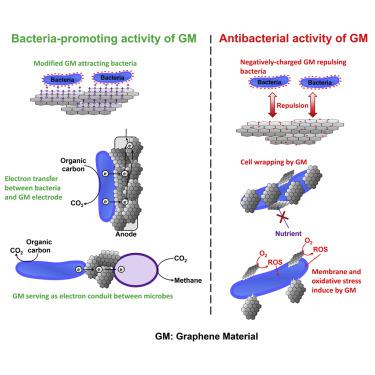iScience ( IF 4.6 ) Pub Date : 2020-11-11 , DOI: 10.1016/j.isci.2020.101787 Tian Zhang 1, 2, 3 , Pier-Luc Tremblay 1, 2

|
Graphene materials (GMs) are being investigated for multiple microbiological applications because of their unique physicochemical characteristics including high electrical conductivity, large specific surface area, and robust mechanical strength. In the last decade, studies on the interaction of GMs with bacterial cells appear conflicting. On one side, GMs have been developed to promote the proliferation of electroactive bacteria on the surface of electrodes in bioelectrochemical systems or to accelerate interspecies electron transfer during anaerobic digestion. On the other side, GMs with antibacterial properties have been synthesized to prevent biofilm formation on membranes for water treatment, on medical equipment, and on tissue engineering scaffolds. In this review, we discuss the mechanisms and factors determining the positive or negative impact of GMs on bacteria. Furthermore, we examine the bacterial growth-promoting and antibacterial applications of GMs and debate their practicability.
中文翻译:

石墨烯:抗菌剂还是细菌增殖促进剂?
石墨烯材料(GM)因其独特的物理化学特性(包括高导电性、大比表面积和强大的机械强度)而被研究用于多种微生物应用。在过去的十年中,关于转基因与细菌细胞相互作用的研究似乎相互矛盾。一方面,GM 的开发是为了促进生物电化学系统中电极表面电活性细菌的增殖,或加速厌氧消化过程中的种间电子转移。另一方面,具有抗菌特性的转基因物质已被合成,以防止水处理膜、医疗设备和组织工程支架上形成生物膜。在这篇综述中,我们讨论了决定转基因对细菌正面或负面影响的机制和因素。此外,我们还研究了转基因在促进细菌生长和抗菌方面的应用,并讨论了它们的实用性。











































 京公网安备 11010802027423号
京公网安备 11010802027423号